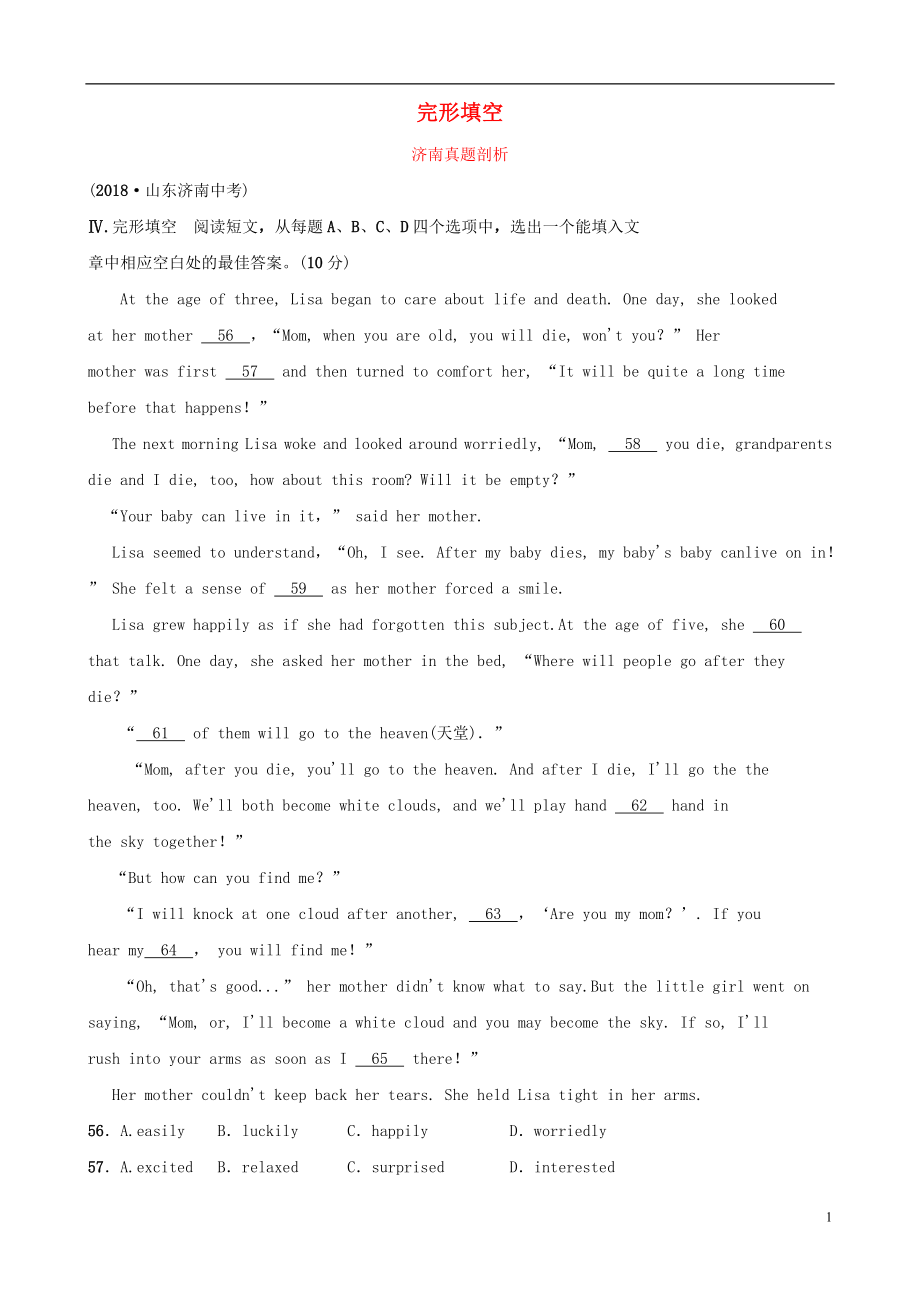《山東省濟(jì)南市2019年中考英語(yǔ) 題型專(zhuān)項(xiàng)復(fù)習(xí) 題型四 完形填空真題剖析》由會(huì)員分享����,可在線(xiàn)閱讀,更多相關(guān)《山東省濟(jì)南市2019年中考英語(yǔ) 題型專(zhuān)項(xiàng)復(fù)習(xí) 題型四 完形填空真題剖析(3頁(yè)珍藏版)》請(qǐng)?jiān)谘b配圖網(wǎng)上搜索�����。
1�����、
完形填空
濟(jì)南真題剖析
(2018·山東濟(jì)南中考)
Ⅳ.完形填空 閱讀短文,從每題A��、B��、C��、D四個(gè)選項(xiàng)中����,選出一個(gè)能填入文
章中相應(yīng)空白處的最佳答案。(10分)
At the age of three, Lisa began to care about life and death. One day, she looked
at her mother 56 ��,“Mom, when you are old, you will die, won't you����?” Her
mother was first 57 and then turned to comfort
2、 her, “It will be quite a long time
before that happens��!”
The next morning Lisa woke and looked around worriedly, “Mom, 58 you die, grandparents die and I die, too, how about this room? Will it be empty�?”
“Your baby can live in it,” said her mother.
Lisa seemed to understand����,“Oh, I see.
3�����、After my baby dies, my baby's baby canlive on in!” She felt a sense of 59 as her mother forced a smile.
Lisa grew happily as if she had forgotten this subject.At the age of five, she 60
that talk. One day, she asked her mother in the bed, “Where will people go after they
die�?”
“ 61
4、 of them will go to the heaven(天堂).”
“Mom, after you die, you'll go to the heaven. And after I die, I'll go the the
heaven, too. We'll both become white clouds, and we'll play hand 62 hand in
the sky together����!”
“But how can you find me?”
“I will knock at one cloud after another, 63 �����,‘
5��、Are you my mom�����?’. If you
hear my 64 ����, you will find me!”
“Oh, that's good...” her mother didn't know what to say.But the little girl went on
saying, “Mom, or, I'll become a white cloud and you may become the sky. If so, I'll
rush into your arms as soon as I 65 there��!”
Her mother couldn
6、't keep back her tears. She held Lisa tight in her arms.
56.A.easily B.luckily C.happily D.worriedly
57.A.excited B.relaxed C.surprised D.interested
58.A.if B.before C.unless D.because
59.A.fear B.relief C.humor D.danger
60.A.avoided B.brought C.continued D.pre
7�、tended
61.A.All B.Both C.None D.Neither
62.A.on B.in C.a(chǎn)t D.to
63.A.writing B.telling C.reading D.a(chǎn)sking
64.A.voice B.sound C.noise D.music
65.A.back B.a(chǎn)way C.up D.down
參考答案
56.D easily“容易地”;luckily“幸運(yùn)地”�����;happily“快樂(lè)地”�;worriedly“擔(dān)心
地”。聯(lián)系上下文可知此處麗薩問(wèn)自己
8�����、的媽媽老了以后是否會(huì)去世����,所以應(yīng)該
是擔(dān)心地,故選D����。
57.C excited“激動(dòng)的”;relaxed“放松的”��;surprised“驚訝的”����;interested“感興
趣的”��。結(jié)合語(yǔ)境可推斷當(dāng)自己的女兒詢(xún)問(wèn)自己是否會(huì)去世時(shí)�,自己的反應(yīng)應(yīng)
該是驚訝的����,故選C��。
58.A if“如果”����;before“在……之前”;unless“除非”�����;because“因?yàn)椤?���。根?jù)上
下文可知此處是一種假設(shè),所以用if引導(dǎo)的條件狀語(yǔ)從句����。
59.B fear“害怕”;relief“安慰�����;緩解”;humor“幽默”�����;danger“危險(xiǎn)”��。結(jié)合上
下文推斷當(dāng)麗薩聽(tīng)到媽媽的回答以及看到媽媽臉上的笑
9��、容可知是麗薩感到一絲
安慰��。
60.C avoid“避免”����;bring“帶來(lái),拿來(lái)”����;continue“繼續(xù)”;pretend“假裝”��。根
據(jù)下文可知麗薩又問(wèn)到關(guān)于生死的問(wèn)題�,可知是繼續(xù)問(wèn)之前問(wèn)過(guò)的問(wèn)題,故選
C�����。
61.A all“三者及三者以上全都”;both“兩者都”�;none“三者及三者以上都
不”;neither“兩者都不”�����。根據(jù)上文麗薩問(wèn)的問(wèn)題“人們?nèi)ナ酪院髸?huì)去哪里�����?”可
知是指所有人�,故選A�。
62.B hand in hand“手牽手”,是固定短語(yǔ)�。
63.D 根據(jù)下文的問(wèn)題“你是我的媽媽嗎?”可知是詢(xún)問(wèn)��,故選asking����。
64.A 根據(jù)上文問(wèn)的問(wèn)題可知是麗薩的聲音,指人的嗓音用voice��。
65.C 句意:我一到那里就會(huì)沖進(jìn)你的懷抱。up“達(dá)到”��。
3
 山東省濟(jì)南市2019年中考英語(yǔ) 題型專(zhuān)項(xiàng)復(fù)習(xí) 題型四 完形填空真題剖析
山東省濟(jì)南市2019年中考英語(yǔ) 題型專(zhuān)項(xiàng)復(fù)習(xí) 題型四 完形填空真題剖析

